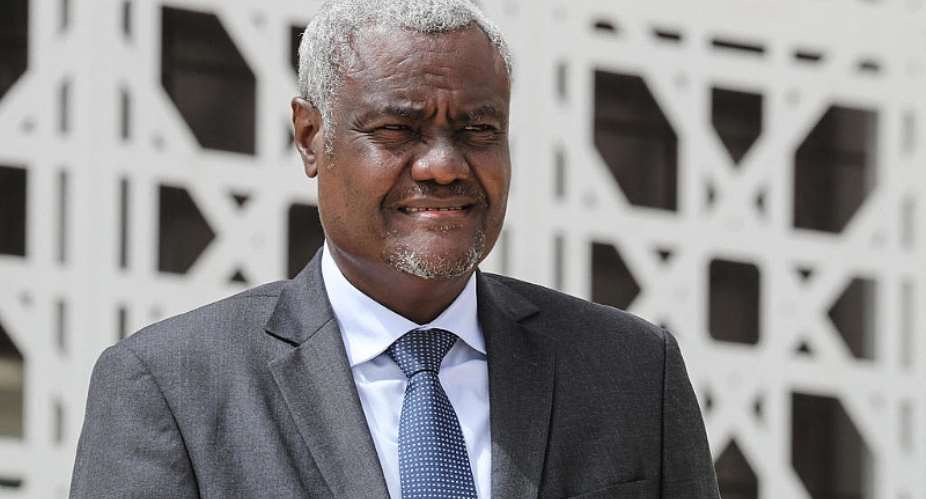This year's African Union summit has closed with the re-election of Moussa Faki Mahamat as chair of the bloc's commission. The virtual summit approved some measures aimed at reforming the organisation, although much work remains on overhauling the continental union.
Moussa Faki stood unopposed for a second term in the AU's top job, the first time this has happened in the history of the bloc. He secured the votes of 51 of the 55 member states.
"Moussa Faki Mahamat is politically savvy,” said Babatunde Fagbayibo, an expert on the African Union at the University of South Africa. “He understands how to play the politics of continental regionalism, and essentially that's the reason why he stood unopposed.”
Moussa Faki has been able to help steer reforms within the regional bloc, according to Fagbayibo. However, there have been reports of mismanagement within the commission, as well as allegations of nepotism and sexual harassment that have not been addressed.
Fighting the ravages of Covid-19
Africa's fight against Covid-19 was one of the main topics on the agenda during the summit, which took place almost entirely online because of restrictions aimed at stopping the spread of coronavirus infections.
Initiatives on Covid-19 taken by South African President Cyril Ramaphosa, former AU chairperson, were validated by African heads of state, notably a platform for purchasing medical supplies.
Other major topics, such as the war in Ethiopia's Tigray region, did not feature on the agenda and were not part of discussions by African presidents.
"We're talking about Tigray as the big elephant in the room, but there are many big elephants in the room,” Fagbayibo told this week's Africa Calling podcast, published this Friday. "The African Union has acted true to character in not discussing the Tigray issue."
Fagbayibo said the AU has developed a number of bad habits, which often help certain governments in their efforts to crack down on dissent or rig elections.
“This African brotherhood approach to handling things and not wanting to call each other out for transgressions” is a problem, added Fagbayibo, describing how the AU avoids confronting such issues head on.
Revitalising the African Union
Reforms to the organisation, begun in 2002, have long been mooted, with Rwanda's President Paul Kagame leading the process which is designed to overhaul the way the continental bloc is run.
The 34th summit did indeed take decisions on reducing the number of commissioners from eight to six and giving the Africa Centres for Disease Control and Prevention (CDC) more autonomy.
But a number of issues remain outstanding, such as the Pan-African Parliament and the African Court of Justice and Human Rights.
“The AU needs to be reformed at a much quicker rate,” said Fagbayibo, who has written extensively on the restructuring of the bloc. “The AU has to be reformed in a way that deepens regionalism in which more powers are given to the African Union Commission."
The AU is stuck in an inter-governmental framework, according to Fagbayibo, and without transferring more power from states to the commission, nothing will change.
Nigeria's government weighed in on the importance of restructuring, as President Muhammadu Buhari outlined the importance of reforms during the summit's close on Sunday.
“Nigeria demands a truly reformed, efficient and effective AU Commission,” said Buhari, according to the Reuters news agency.
Rwanda's Kagame, the AU's point man on reforms, has expressed frustration at the slow rate of change within the organisation. Yet the whole process has not taken into account diverging views, the balance between state sovereignty and consultations at a grassroots level, necessary to make the process legitimate, according to Fagbayibo.
"When it comes to the high politics, the sensitive issues, those are things that are still found wanting,” he said. “It has to be addressed, to make this reform process more concrete and more progressive.





 Lay KPMG audit report on SML-GRA contract before Parliament – Isaac Adongo tells...
Lay KPMG audit report on SML-GRA contract before Parliament – Isaac Adongo tells...
 Supervisor remanded for stabbing businessman with broken bottle and screwdriver
Supervisor remanded for stabbing businessman with broken bottle and screwdriver
 NDC watching EC and NPP closely on Returning Officer recruitment — Omane Boamah
NDC watching EC and NPP closely on Returning Officer recruitment — Omane Boamah
 Your decision to contest for president again is pathetic – Annoh-Dompreh blasts ...
Your decision to contest for president again is pathetic – Annoh-Dompreh blasts ...
 Election 2024: Security agencies ready to keep peace and secure the country — IG...
Election 2024: Security agencies ready to keep peace and secure the country — IG...
 People no longer place value in public basic schools; new uniforms, painting wil...
People no longer place value in public basic schools; new uniforms, painting wil...
 'Comedian' Paul Adom Otchere needs help – Sulemana Braimah
'Comedian' Paul Adom Otchere needs help – Sulemana Braimah
 Ejisu by-election: Only 33% of voters can be swayed by inducement — Global InfoA...
Ejisu by-election: Only 33% of voters can be swayed by inducement — Global InfoA...
 Minority will expose the beneficial owners of SML, recover funds paid to company...
Minority will expose the beneficial owners of SML, recover funds paid to company...
 Prof. Opoku-Agyemang has ‘decapitated’ the NPP’s strategies; don’t take them ser...
Prof. Opoku-Agyemang has ‘decapitated’ the NPP’s strategies; don’t take them ser...
